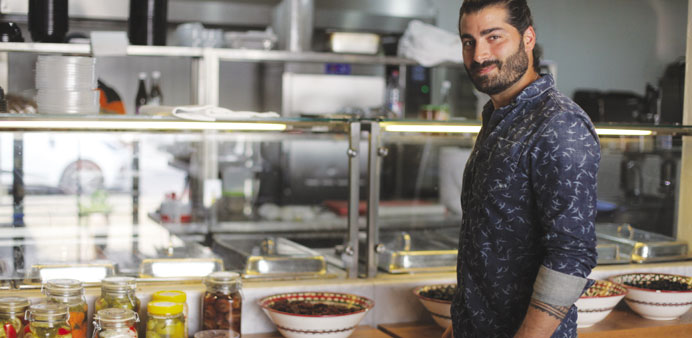In Ramallah, restaurateur Sari Sakakini stands in his half-stocked Orjuwan Deli, testament to his struggle to maintain talented kitchen staff.
By Daniella Cheslow/Ramallah, West Bank/TNS
When Sari Sakakini opened his ceramic-tiled Orjuwan deli in Ramallah’s well-to-do Masyoun neighbourhood, he hoped it would be the start of a global franchise of Palestinian food. A year later, that hope has dimmed.
The shop’s bright wooden shelves hold only a sparse collection of homemade sauces, glossy olives and prepared soups. His kitchen staff, which also cooks for the attached restaurant of the same name, could not keep up the inventory.
“I want to put Palestinian food all over the world,” said Sakakini. “But over here, it’s just putting food on the table.”
Ramallah is the cultural and political hub of West Bank Palestinian life, and in recent years it has seen a blossoming of restaurants. But unlike top-tier eateries in Beirut or Amman, Jordan, Ramallah’s culinary scene stews under a lid of a stagnating local economy, conservative tastes and onerous Israeli restrictions.
It’s a frustration for Palestinian food professionals, whose distress is heightened by living alongside an Israeli culinary boom.
Skilled staff are sparse in a land with few culinary schools. Sakakini’s head chef is a full-time schoolteacher from the West Bank city of Hebron. There are no full-time Palestinian food critics or gastronomy magazines to spur innovation.
Peter Nasir, who’d hoped his Azure restaurant would become a culinary destination, recently lamented that chicken chow mein was about all the adventure his clientele would tolerate.
And for all the eateries, profits are filo dough-thin, reflecting double taxation on imported ingredients and a tiny stock of customers shared among dozens of restaurants.
“Palestine is literally a forgotten corner,” Sakakini said. “Jordan is ... at least five or 10 years ahead of us. Lebanon is also at least 10 years ahead of us.”
Peter Nasir, 34, studied computer science at Emory University in Atlanta and discovered his love of food while cooking for his roommates. They relished his okra stew and mensaf, a dish made with rice, meat and rehydrated salty dried yoghurt.
Nasir returned to Ramallah, and after working for foreign aid organisations, in 2007 he converted his family’s stone home and shaded courtyard into Azure. When he opened its doors, Nasir planned a short, curated menu highlighting local fare, fresh ingredients and subtle foreign twists. His enthusiasm was boundless; his customers’ was not.
To stay in business, Nasir sliced down his ambitions and tripled his offerings. Today he serves Palestinian standards like hummus and grilled meats along with hamburgers, Mongolian-style steak and chicken Cordon Bleu, a cut of chicken breast pounded flat, wrapped around cheese and a slice of smoked turkey and fried.
“You have to target the masses,” Nasir said. “When people are strapped for cash they want something guaranteed. They don’t want to spend their money experimenting.”
Nasir’s quandary highlights the grinding realities of life in Ramallah. The average Israeli annual salary is 10 times the average Palestinian’s of about $3,000.
A quarter of Palestinian workers are employed by their government, and when the national budget runs low - as happened in February when Israel froze the transfer of taxes to Ramallah - business slows down.
Beyond sheer economics, Nasir’s customers are more risk averse because they travel far less than their Israeli counterparts. Most West Bank and Gazan Palestinians are prohibited from entering Israel or using the Tel Aviv airport. Travel abroad via Jordan is possible but a nuisance.
Even driving between Bethlehem and Ramallah within the West Bank can take hours because of bypass roads that skirt Jerusalem.
Despite the limitations, Palestinian cooking is not without aspirations. The Gaza Kitchen cookbook, published in 2013, garnered international acclaim for its recipes of spicy seaside cuisine from the isolated enclave.
East Jerusalem chef Johnny Goric trained in the holy city’s Notre Dame hospitality school, then studied at the French culinary bastions Institut Paul Bocuse and Lycee Francois Rabelais. Now Goric is finalising the syllabus for a $500,000 culinary academy he plans to open in Ramallah in September that will train students in local cuisine and international techniques.
Goric won three gold medals at the 2010 Chef’s World Cup in Luxembourg for his tapas, fish platters and terrines. Often, while his kitchen staff at the Legacy Hotel turn out a traditionalist menu of Palestinian and Italian stalwarts, Goric crafts beautifully plated entrees for competitions abroad.
At Orjuwan, co-owner Sakakini said Goric’s school would be a lifeline. He said managing and training staff to use state-of-the-art equipment like a steam oven has been so all-consuming that when he started a food magazine called Ingredients in 2012, he folded after three months for lack of time.
“Our cuisine is rich but it has to be better presented and upgraded,” Sakakini said. “We’re not missing anything.”

